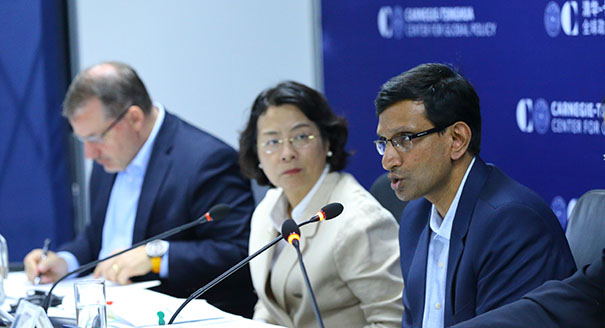Registration
You will receive an email confirming your registration.
Many hailed the informal Wuhan summit between President Xi and Prime Minister Modi last April as the beginning of a new chapter in China-India ties. However, relations between the world’s two most populous countries remain tense. Despite Beijing’s repeated invitations, for the second time in a row New Delhi did not send a high-level delegation to China’s Belt and Road Forum. India continues to view China’s close relations with and investment in Pakistan through the China-Pakistan Economic Corridor as threats to its own regional interests. Amid lingering tensions in Kashmir, New Delhi is frustrated that China has repeatedly blocked a United Nations Security Council resolution labeling a Pakistan-based militant group a terrorist organization. As China’s naval presence in the Indian Ocean grows, New Delhi has begun building up its own navy to counter the perceived growing threat. Against a backdrop of growing strategic mistrust, how can China and India advance their relationship and limit areas of confrontation?
Shortly before the results of India’s general elections are announced, Carnegie–Tsinghua Center Director Paul Haenle moderated a discussion with Chinese and Indian scholars on the current state of Beijing-New Delhi ties and the outlook for bilateral relations, as well as the impact of the Trump administration’s policies on South Asia.
This panel was the fifth and final of the 2018-2019 Carnegie Global Dialogue Series.
This event was off the record.
Discussion Highlights
- Complex Historical Dynamics: The panelists agreed that the rise of China and India has resulted in a tilt away from cooperation and toward more pronounced competition. However, the two countries do not think about their ties and goals in a zero-sum manner. Although bilateral relations have been tested by several border standoffs, most recently the Doklam crisis, the China-India relationship has never completely deteriorated. The discussants argued that the resilience of the relationship bodes well for the future.
- Resetting the Relationship: The discussants stated that the informal Wuhan meeting helped normalize the China-India relationship, as the two countries were able to move past previous disagreements and chart a path for better cooperation. Since then, the China-India relationship has progressed without the baggage of the past, and has broadened through increased information sharing and logistics coordination between the two capitals and militaries.
- Challenges and Opportunities: Although bilateral relations are on a positive track, there are still a number of contentious issues, including China’s growing naval presence in the Indian Ocean and influence in South Asia, as well as disputes over resources, trade imbalances, and India’s inclusion in the Nuclear Suppliers Group. The main source of friction remains India’s refusal to formally sign on to China’s Belt and Road Initiative (BRI). The panelists said, however, that the two countries are discussing collaborating on infrastructure projects that are not designated part of the BRI.
- The Wuhan Spirit: Since the Wuhan summit helped foster a spirit of cooperation between Beijing and New Delhi, the panelists argued that it is important to act now to further cement positive ties going forward. Capitalizing on the “Wuhan spirit” necessitates keeping sensitive issues, such as border disagreements, in focus while working on mutually beneficial areas, such as infrastructure development and broader economic engagement. As emerging powers, China and India are engines for global development and can also contribute to global security. Working together, the discussants said, would benefit not only China and India’s own populations, but also those of neighboring countries.
Paul Haenle
Paul Haenle holds the Maurice R. Greenberg Director’s Chair at the Carnegie–Tsinghua Center for Global Policy based at Tsinghua University in Beijing. His research focuses on Chinese foreign policy and U.S.-China relations.
Han Hua
Han Hua is associate professor and director of the Center for Arms Control and Disarmament at the School of International Studies (SIS) at Peking University.
Rudra Chaudhuri
Rudra Chaudhuri is the director of Carnegie India. His primary research focuses on the diplomatic history of South Asia and contemporary security issues.
Ma Jiali
Ma Jiali is the executive deputy director of the Center for International Strategic Studies at the China Reform Forum.
Srinath Raghavan
Srinath Raghavan is a senior fellow at Carnegie India and professor of International Relations and History at Ashoka University.
